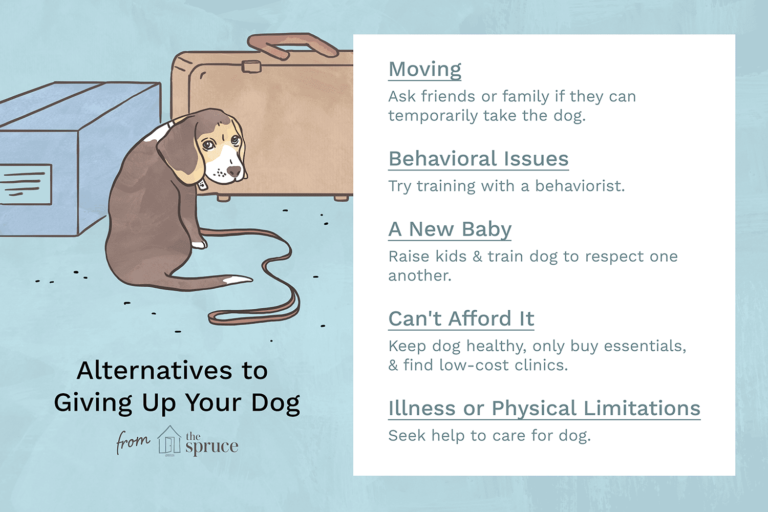If you can’t take care of your dog anymore, it’s important to find a suitable solution. The decision to give up your dog requires careful consideration and responsible action.
You may be facing various challenges, such as financial constraints, changes in living situation, or health issues, making it difficult to continue caring for your beloved pet. It’s essential to understand that there are options available to ensure the well-being of your dog.
By approaching the situation with empathy and understanding, you can explore avenues such as rehoming, fostering, or seeking assistance from animal welfare organizations. It’s crucial to prioritize the dog’s welfare and safety in this challenging time. This guide aims to provide practical guidance and resources to help you navigate through this difficult decision while ensuring the best outcome for your pet.

Credit: charitypaws.com
Signs That You Can’t Take Care Of Your Dog
If you’re struggling to care for your dog, there are signs to look out for. These include neglecting feeding and exercise, not providing proper healthcare, and lacking time for quality interaction. Recognizing these signs can help you make the best decision for your pet’s well-being.
Lack Of Time
One of the signs that you can’t take care of your dog is a lack of time. Dogs require regular attention and care, including feeding, exercise, and socialization. If you find yourself constantly overwhelmed with work or other commitments, it may be a clear indication that you are unable to give your dog the time and attention it deserves.
Without sufficient time, your dog may become neglected and suffer from boredom, resulting in behavioral issues such as destructive chewing or excessive barking. It is important to consider your schedule and evaluate whether you can dedicate enough time to meet your dog’s needs.
If you consistently find it difficult to balance your time between work, personal life, and your dog, it might be time to consider alternatives such as finding a new home for your furry friend or seeking assistance from family, friends, or professional dog walkers.
Financial Difficulties
Another sign that you can’t take care of your dog anymore is financial difficulties. Dogs require financial commitment for their food, grooming, medical expenses, and other necessities. If you are struggling to afford these expenses, it could be a strong indication that providing proper care for your dog is becoming a challenge.
It is essential to prioritize your dog’s well-being and ensure that you can financially support them. If you constantly find yourself unable to provide the necessary veterinary care or buy quality food for your dog, it may be time to reevaluate your situation.
Consider exploring options such as pet insurance, seeking assistance from local animal organizations or low-cost veterinary clinics, and budgeting more effectively to ensure that your dog’s needs are met. If you are unable to make ends meet, finding a loving home for your dog where they will receive the care they deserve might be the best decision.
Health Issues
Health issues can also be a significant indication that you can’t take care of your dog anymore. If you are experiencing personal health problems that hinder your ability to care for your dog properly, it may be time to consider alternative options.
Dogs require regular exercise, mental stimulation, and physical activity to maintain their overall health and well-being. If your health issues prevent you from providing these essential aspects of care, it can negatively impact your dog’s quality of life.
It is important to prioritize your own health and ensure that your dog’s needs are met. Explore options such as finding a trusted friend or family member who can temporarily or permanently care for your dog, or consider contacting local rescue organizations that can help rehome your dog to a suitable environment.

Credit: www.caringseniorservice.com
Options For Rehoming Your Dog
When facing the difficult decision of rehoming a dog, it’s important to consider the options available for finding a new and loving home. Exploring various avenues for rehoming your dog can offer the best chance of a successful transition. Below, we outline the options for rehoming your beloved pet, from finding a new owner to reaching out to rescue organizations and utilizing online platforms.
Finding A New Owner
Rehoming your dog by finding a new owner personally can be an effective and direct method. It involves reaching out to acquaintances, friends, or family members who may be interested in adopting a dog. Additionally, leveraging social media platforms and local community groups can help broaden the search for potential adopters.
Contacting Rescue Organizations
If finding a new owner privately isn’t viable, contacting rescue organizations can be an excellent alternative. These organizations specialize in finding suitable homes for dogs in need and often have an established network of potential adopters. Reach out to local animal shelters, breed-specific rescues, and non-profit rescue groups to explore this option.
Utilizing Online Platforms
Utilizing online platforms provides a vast reach for finding a new home for your dog. Websites dedicated to pet adoption, such as Petfinder and Adopt-a-Pet, offer a platform for listing your dog and connecting with potential adopters. Social media platforms, including Facebook and Instagram, can also be utilized to reach a wider audience and engage with individuals or families interested in adopting a dog.
Factors To Consider Before Rehoming Your Dog
Before rehoming your dog, there are several factors to consider. Assess your ability to take care of your dog, evaluate your lifestyle, and research potential adopters extensively to ensure your dog’s well-being.
Factors to consider before rehoming your dog:Your dog’s temperament and behavior ————————————– < p >It’s crucial to evaluate your dog’s temperament and behavior before deciding to rehome them. Consider if they are friendly, anxious, aggressive, or possess any specific behavioral traits.Your dog’s specific needs ————————————– < p >Assess your dog’s specific needs in terms of exercise, grooming, and medical requirements. Documenting these details can help potential new owners understand what level of care your dog requires.The new owner’s suitability ————————————– < p >Ensure that the potential new owner’s lifestyle and home environment align with the specific needs and temperament of your dog. Consideration of these factors will help guarantee the new owner’s suitability.Steps To Take When Rehoming Your Dog
Rehoming a dog can be a tough decision, but sometimes it’s necessary for the well-being of both you and your pet. If you find yourself in a situation where you can no longer take care of your dog, it’s important to go through a process that ensures they are placed in a loving and safe forever home. Here are some steps to take when rehoming your dog:
Ensure Your Dog Is Properly Vaccinated And Groomed
Prior to rehoming your dog, it’s crucial to make sure they are up to date on their vaccinations and have had a recent grooming session. This not only increases their chances of finding a new home faster, but it also shows potential adopters that you have taken good care of your dog.
By providing proof of vaccination and documentation of recent grooming, you can assure potential adopters that they are getting a healthy and well-maintained companion. This step is paramount in building trust and credibility with prospective adopters, assuring them of your dog’s overall well-being.
Create A Compelling Advertisement
When it comes to finding a new home for your dog, a well-crafted advertisement can make all the difference. Write a captivating and sincere description of your dog, highlighting their positive traits, temperament, and any additional information that may attract potential adopters.
Make sure you include clear, high-quality photographs of your dog that showcase their unique features and personality. This will help potential adopters form a connection even before meeting your dog in person. Be honest about any behavioral issues or special needs your dog may have so that interested individuals can make an informed decision.
Screen Potential Adopters
It is essential to screen potential adopters carefully to ensure your dog is going to a responsible and loving home. Start by creating a questionnaire that asks relevant questions about their lifestyle, previous experience with dogs, and their expectations for pet ownership.
Additionally, conduct personal interviews or meet-and-greets to get a sense of how well potential adopters bond with your dog. Observe their interactions and ask follow-up questions to gauge their level of commitment and understanding of the responsibilities that come with owning a dog.
Remember, finding the right match is crucial for your dog’s long-term well-being, so take the time to thoroughly assess and evaluate potential adopters before finalizing the rehoming process.
Dealing With Emotions After Rehoming Your Dog
Adjusting to the emotions after rehoming a dog when unable to care for them can be difficult. It’s okay to feel a mix of sadness and relief. Take your time to grieve the loss, and remember that you made the best choice for your pet’s well-being.
Grieving The Loss
After rehoming your dog, it is natural to experience a sense of loss and to grieve the separation. Just like any major change in life, giving up your furry friend can be emotionally challenging. Allow yourself the time and space to process these emotions and understand that it is normal to feel sadness and grief.
Here are a few tips to help you cope:
- Give yourself permission to grieve: Acknowledge and accept your feelings of sadness and loss. It’s important not to suppress your emotions.
- Take care of yourself: Engage in self-care activities that help you heal, such as exercising, practicing mindfulness, or journaling.
- Allow yourself to reminisce: Look at pictures and videos of your dog, and cherish the memories you shared together. Take comfort in knowing that your dog will be loved and cared for in their new home.
Staying Connected With The New Owner
One way to ease the emotional burden of rehoming your dog is to stay connected with the new owner. Building a relationship with the person who adopted your dog can provide reassurance and comfort, knowing that your companion is in good hands.
Consider the following to keep in touch:
- Exchange contact information: Share your email address or social media profiles with the new owner.
- Arrange visits or playdates: If feasible, schedule occasional visits or playdates with your dog and their new owner. This can help maintain a sense of connection and alleviate any lingering worries.
- Receive updates: Request periodic updates about your dog’s well-being. Hearing about their happiness and adjustment in their new home can bring you peace of mind.
Seeking Support From Friends And Family
During this emotional time, it is crucial to lean on your loved ones for support. Your friends and family can provide comfort and understanding as you navigate the complex emotions associated with rehoming your dog.
Here’s how you can seek support:
- Talk about your feelings: Share your emotions and thoughts with trusted friends or family members who will provide a listening ear without judgment.
- Join support groups: Look for online or local communities that focus on pet rehoming or coping with pet loss. Connecting with others who have gone through similar experiences can be incredibly healing.
- Consider professional help: If your feelings become overwhelming or interfere with your daily life, don’t hesitate to seek guidance from a therapist or counselor. They can offer specialized support and coping strategies.
Credit: www.quora.com
Frequently Asked Questions For I Can’t Take Care Of My Dog Anymore
Can I Surrender My Dog To A Shelter?
Yes, many animal shelters accept surrendered dogs, providing them with a safe and caring environment until they find a new home.
Are There Organizations That Can Help With Rehoming My Dog?
Absolutely! There are various organizations dedicated to helping people rehome their dogs. They can assist in finding a suitable new owner for your furry friend.
What Steps Can I Take To Find A New Home For My Dog?
Start by reaching out to friends, family, and acquaintances who may be interested in adopting a dog. Utilize online platforms or social media to widen your search and spread the word about your dog’s availability for adoption.
Conclusion
Taking care of a dog is a huge responsibility, and facing the reality of not being able to provide the care they need can be difficult. If you find yourself in this situation, it’s important to remember that there are options available.
Consider reaching out to local animal shelters or rescue organizations who can help find a loving home for your furry friend. Remember, it’s not an easy decision, but prioritizing your dog’s well-being should always come first.



